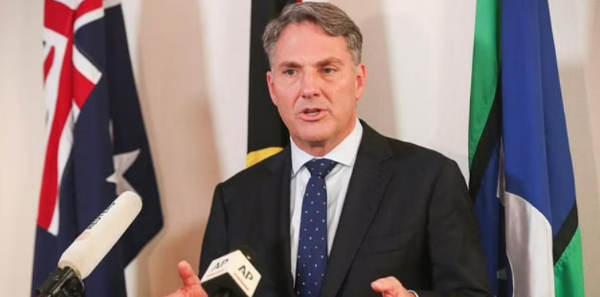Richard Marles, Minister of Defence of Australia, stated on Wednesday that “The assault on Indian forces along the Line of Actual Control in 2020 should serve as a wake-up call to us.”
He referred to them as the most dangerous army configuration to have evolved since the Second World War. The entire world should pay attention to the activities that they are involved, he further noted that.
He reportedly made reference to the fighting in the Galwan Valley. China must make a firm commitment to settling this conflict through a diplomatic procedure that complies with international law. He emphasized the importance of the global rules-based order.
Marles was speaking to the audience at New Delhi’s National Defence College. He reiterated that his visit is aimed at placing India at the heart of Australia’s approach to the Indo-Pacific and beyond. See here.
“An arms race is sparked by insecurity. India’s own experience serves as an example of this adage. The attack on Indian forces near the Line of Actual Control in 2020 served as a cautionary tale,” according to Marles.
He argued that because of their geographic proximity, Australia and India serve as the region’s stewards.
“The Indian Ocean, which carries nearly half of the world’s container traffic and is a key trading route, Due to its geographic location, India is the obvious choice to lead this region, and Australia continues to support it. ”
Marles, who is also Australia’s deputy prime minister, met Rajnath Singh, the Indian defence minister. Australia has always stood up for India, he claimed, and it will continue to do so in the future as well.
According to the Australian Minister of Defence, defence and security cooperation between Australia and Indian forces will continue to grow. He added that the next essential approach is to investigate longer-term reciprocal access agreements.
The Australian-Indian Security Conference might be seen as an effective countermeasure to a rising China. If we cooperate, the two democracies could potentially bring about a significant change in geopolitical circumstances. Additionally, it should be recognized that China is not always the focal point of events.
Marles stated that the resurgence of violence in Europe is another warning in relation to the Russia-Ukraine conflict. He made it plain that he had no desire to instruct India on how to oversee this conflict. India is a sovereign nation and it has the right to conduct its business on its own.
According to the Australian Minister of Defence, Canberra’s investments in long-range and precision strike weapons and other deterrence tools are a sensible and essential reaction to the military build-up in the Indo-Pacific region.
India amidst the Russian-Ukraine conflict
The world has taken notice of India’s position on the crisis between Russia and Ukraine. It has denounced the killing of Ukrainian citizens. It did not, however, take part in any pertinent UN resolution associated with the conflict.
India has already started negotiation related to Free Trade Agreement with the European Union. It resumed after almost 8 years.
Previously, USA had also acknowledged India’s strategic relationship with Russia. The recent statement from Washington DC says that they are “there for India”.
India and the Indo-Pacific region
Asia has now become the center of attention. The Indian Ocean and the Pacific Ocean provide sea lanes, which is why they are important for maritime routes. Additionally, the majority of world trade takes place in these oceans.
The United States views the Indo-Pacific as being free and open, emphasizing the value of rules or norms of conduct in the area and working to limit China’s influence there.
The Indo-Pacific area also has a considerable impact on ASEAN countries’ policy.
India regards the area as inclusive, open, integrated, and balanced. India is constantly emphasizing strategic interconnections, shared difficulties, and opportunities between the Indian Ocean and the Pacific.
For India to tackle the difficulties of the Indo-Pacific region, it needs to develop strong naval capabilities, multilateral diplomacy, and economic integration with other states. SAGAR, or Security and Growth for All in the Region, is India’s goal for the Indian Ocean.













